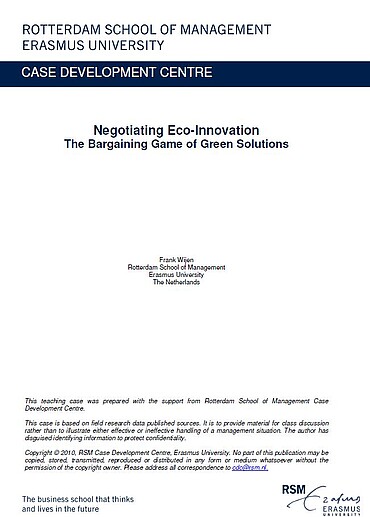Citation Note
Based on published sources; 10 pages.
Follow the 'handle' link to access the Case Study on RePub.
For EUR staff members: the Teaching Note is available on request, you can contact us at rsm.nl/cdc/contact/
For external users: follow the link to purchase the Case Study and the Teaching Note.
Objective
The objectives of this case include: 1. To show the complexity of realizing a product innovation; 2. To demonstrate under what conditions bargaining games can lead to innovative solutions; 3. To raise awareness that environmentally sound solutions typically require a good deal of ‘wheeling and dealing’.
description
Passion and conviction are not sufficient to realize eco-innovation. Only after a good deal of “wheeling and dealing”, one Dutch firm finally implemented environmentally sound solutions.
Abstract
Eureka is a century-old Netherlands-based company with multiple divisions and worldwide operations. Its focal division has had a ‘green’ focus since the early 1990s, first to ensure legal compliance and later on to achieve eco-efficiency and green marketing. Environmental coordinator, Peter Jansen, is involved in protracted negotiations with both external constituencies (the European Commission and the European trade association) and different internal actors (including an environmental steering group, business units, and the corporate research laboratory) to garner support for an environmentally benign product innovation. He eventually manages to get the green light from all stakeholders and realize his eco-innovation.
usage
From this case, the audience can get a realistic view of how innovations are developed in practice: Innovations have to satisfy pre-conditions set by external parties. As different parties have different requirements, there are constant negotiations between innovator and external stakeholders, and an innovative idea can fail at any time.
